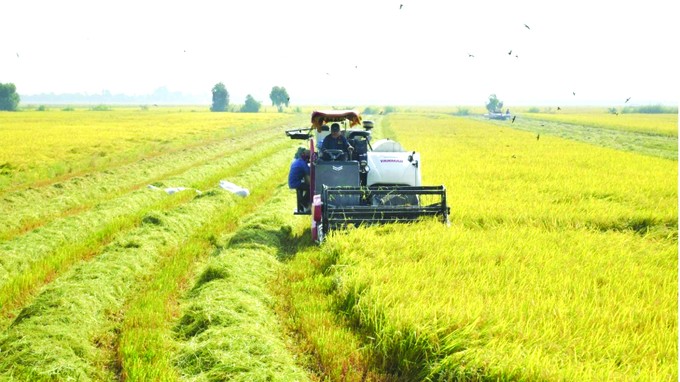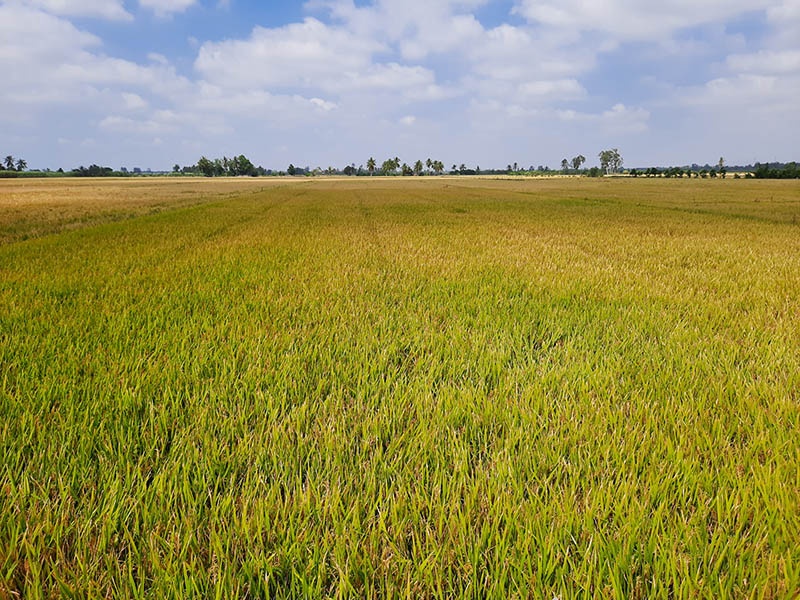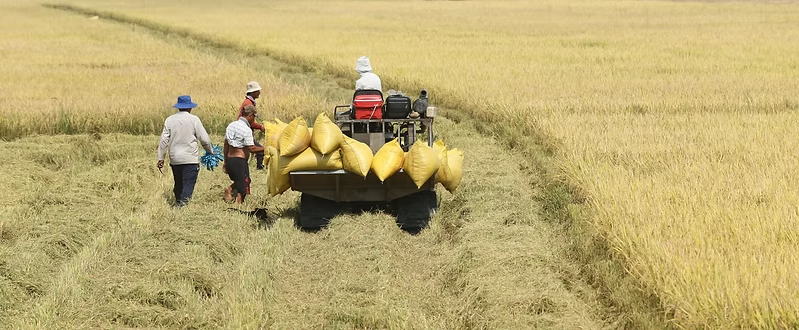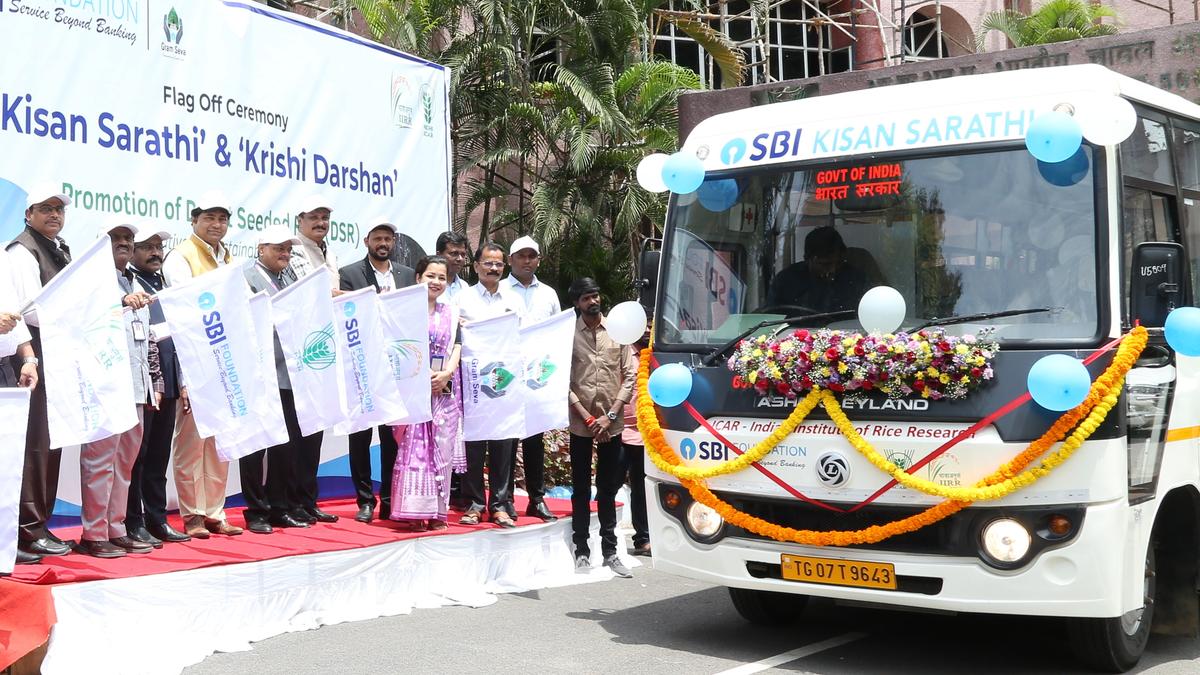Tags
Carbon credit export from rice, coconut production
In 2023, Vietnam achieved its first sale of 10.3 million forest carbon credits (equivalent to 10.3 million tons of CO2), generating around US$51.5 million (VND1.25 trillion).

Harvesting rice produced under sustainable farming practices in Long An
The development of the carbon market has spurred the growth of green and circular economies while providing substantial financial gains for the nation. The Mekong Delta region, notably, has been identified as having significant potential in this market.
With over 143,000 hectares of forest and forestry land, Ca Mau province possesses significant potential and advantages in the formation and development of the carbon market. Since 2020, the provincial authorities have organized meetings for residents, forest owners, and businesses to hear expert talks and receive advice on carbon market-related issues. According to experts, forest carbon credits stem from greenhouse gas emission reduction projects, reducing deforestation and forest degradation, promoting forest planting, care, protection, and development, and encouraging vegetation regeneration. Forest owners can convert the amount of CO2 absorbed from managed forest areas into carbon credits for trading on the market.
Mr. Le Van Su, Deputy Chairman of the People’s Committee of Ca Mau Province, assessed that implementing forest carbon absorption and storage services would provide a significant and sustainable financial source for the locality each year. This funding will support effective forest management, planting, care, protection, and development, reducing pressure on the State-budget-funded investment into the forestry sector. However, the implementation of this activity faces challenges due to the lack of a legal framework and detailed technical guidelines on transfer, benefit sharing, and determining carbon credit prices. Therefore, he hopes that the central government will soon complete the legal framework regarding carbon credit counting, certification, and trading, enabling Ca Mau and other localities to effectively tap into the potential of the forestry economy.
In Kien Giang, the representative from the VnSAT Project Management Board in Kien Giang Province announced that in 2024, Kien Giang would participate with 60,000 hectares of rice cultivation in the Sustainable Development of One Million Hectares of High Quality and Low-Emission Rice Associated with Green Growth in the Mekong River Delta by 2030. Accordingly, they plan to sell carbon credits for approximately 30,000 hectares. By 2025, the province aims to expand the area of high-quality, low-emission rice cultivation to 100,000 hectares, with an estimated sale of carbon credits for around 40,000 hectares.
Analyzing the benefits of carbon exploitation in rice production, Mr. Huynh Van Thon, Chairman of Loc Troi Group, highlighted that rice production currently contributes to approximately 50 percent of greenhouse gas emissions. Vietnam is actively addressing this issue to achieve zero net emissions, as committed. Furthermore, Vietnam is establishing a sustainable rice production ecosystem with internationally recognized farming practices. Specifically, the government has initiated the Sustainable Development of One Million Hectares of High Quality and Low-Emission Rice Associated with Green Growth in the Mekong River Delta by 2030. While the processes and direction are already established, the remaining challenge lies in how managers can effectively organize and mobilize farmers to align with these objectives. By accomplishing this, the utilization of carbon credits in rice production will yield significant future benefits.
According to the Department of Agriculture and Rural Development of Ben Tre Province, there are approximately 78,000 hectares of coconut trees in the province. This presents a favorable opportunity for selling carbon credits derived from these “coconut fields.” In July 2024, Ben Tre will host a workshop focusing on the establishment and development of the carbon market for coconut trees. While the carbon credit market holds great potential, Vietnamese enterprises encounter various obstacles and financial challenges in entering this market. Therefore, Vietnam needs to strategize and implement solutions to overcome these barriers effectively.
As per the Ministry of Agriculture and Rural Development, to exploit and sell carbon credits from rice production, the rice production region in the Sustainable Development Project for 1 million hectares of high-quality rice cultivation in the Mekong Delta must ensure specific production conditions. These conditions entail reducing rice seed usage to 80kg per hectare, cutting chemical fertilizer application by 30 percent, minimizing chemical plant protection products by 40 percent, and decreasing irrigation water consumption by over 30 percent. Furthermore, the adoption rate of Good Agricultural Practices (GAP) and equivalent practices must reach 100 percent, while the incorporation of advanced technology and digital solutions should exceed 50 percent. Greenhouse gas emissions should be curtailed by over 20 percent, and the collection and utilization of rice straw, covering 100 percent of harvested areas, is imperative.
By Thanh Tam – Translated by Thuy Doan
https://en.sggp.org.vn/carbon-credit-export-from-rice-coconut-production-post109667.htmlPublished Date: April 30, 2024






